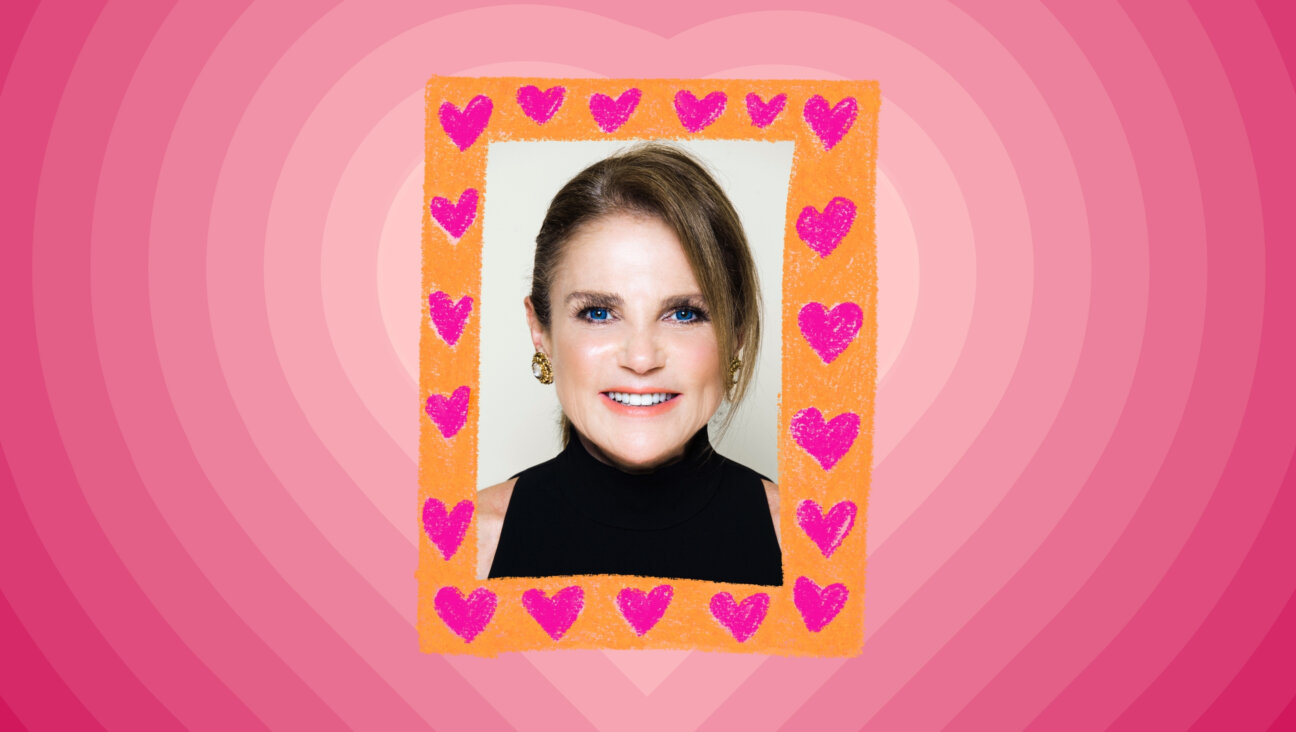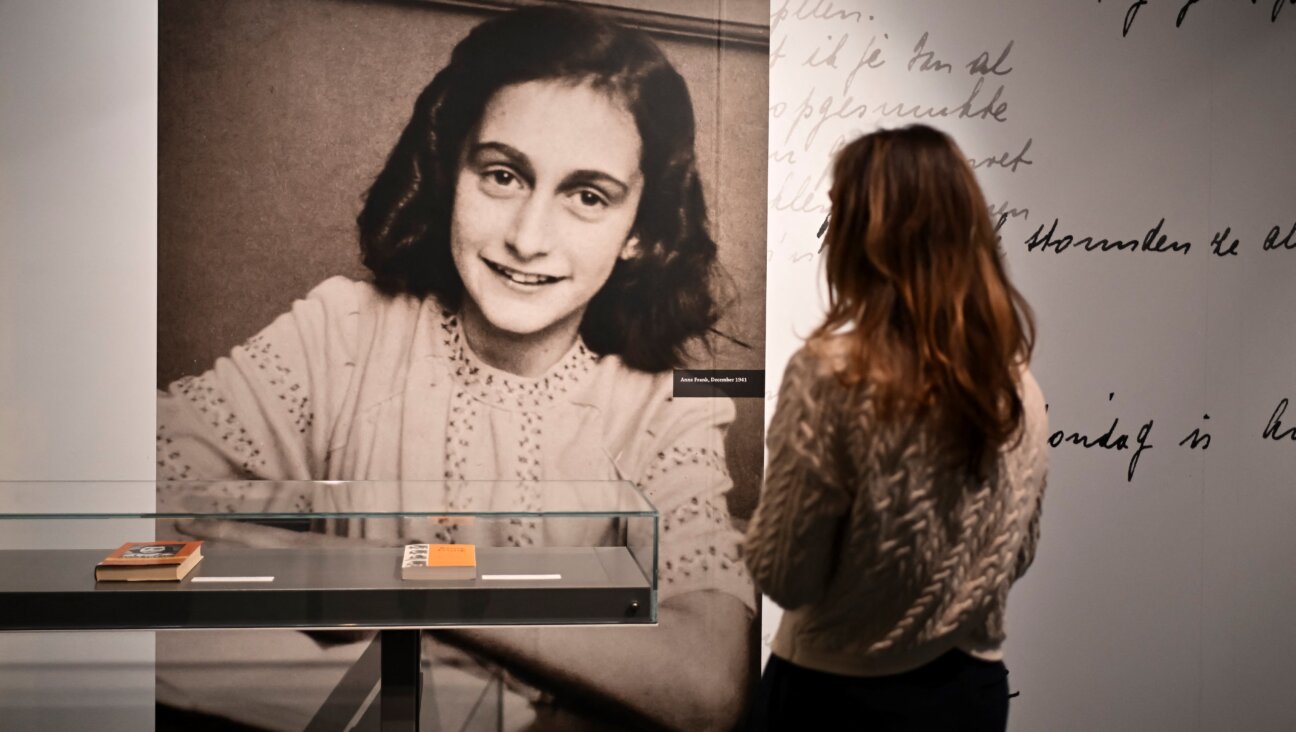Hollywood: Where Jews Don’t Get To Play Jews

Charlton Heston in “The Ten Commandments” Image by Getty Images
I was 4 or 5 when the hot topic at dinner was the movie version of “Marjorie Morningstar.” Too young to understand why Mom was unhappy about it, I understood enough to get that Natalie Wood, a goy, had been cast in the title role in the screen adaptation of Herman Wouk’s novel. But why was it a shande? Now I see that Mom believed there must have been a “Semitic” actress who could have played the comeliest Jewess in literature since Rebecca in “Ivanhoe.” (I wonder if Mom remembered that six years earlier, before she converted to Judaism, Elizabeth Taylor had been cast as Rebecca when MGM released its version of “Ivanhoe.”) Did the studio chiefs equate “comely” with “gentile”? Did they not know that casting non-Jews in “our” stories made us feel unworthy?
My immigrant parents learned how to become Americans at the movies. And they worried about what Americans might learn at the movies about Jews. Of course, casting gentiles as Jews doesn’t have the racial (and racist) implications it did when Ava Gardner played Julie, a biracial woman passing for white in “Showboat,” or when Mickey Rooney played Mr. Yunioshi, Audrey Hepburn’s Japanese-American landlord, in the 1961 film “Breakfast at Tiffany’s.” Still, whenever I saw a non-Jew playing a Jew, often with exaggerated hand gestures and singsong diction, I felt a sting. To alleviate it, Dad made up a game: He designated gentiles who played Jews as “honorary landsmen.” The first was Charlton Heston as “Ben-Hur” (1959).
What Mom and Dad didn’t know was that during Hollywood’s golden age — roughly from 1925 to 1965 — Jews rarely played Jews in the movies. Call it Hollywood’s Jewish Paradox. “You can’t have a Jew playing a Jew, it wouldn’t work on screen,” producer Samuel Goldwyn argued, explaining that he wanted Frank Sinatra rather than Sam Levene — who had originated the role — to play the part of Nathan Detroit in “Guys and Dolls.” While Goldwyn never explained why Levene wouldn’t work, obviously Sinatra was a household name and Levene was not.
Equally paradoxical: Even though the men who built Hollywood were largely Jews, they rarely produced movies about Jews. When they hired Jews, they rechristened them with gentile names — Marion Levy became Paulette Goddard, Jacob Garfinkle was renamed John Garfield, and so on. (In the silent film era, Douglas Ullman renamed himself Douglas Fairbanks, keeping under wraps the fact that his father was Jewish). In the infrequent case that there was a Jewish narrative, more often than not gentiles were cast as Jews; for instance, George Arliss in the title role in “Disraeli” (1929) and in the double role of Mayer and Nathan Rothschild in “The House of Rothschild” (1934).
(A major exception to the rule of no-Jews-as-Jews was that in small roles — like those taken played by the wonderful character actors Felix Bressart, Leonid Kinskey and S.Z. Sakall — Jews did play Jews in movies. The Marx Brothers, nephews of the famed ethnic vaudevillian Al Shean, were more or less trans-ethnic, with Chico playing “Italian” and all of them mocking the WASP establishment.)
So I went looking for the roots of the paradox. Was casting non-Jews as Jews originally seen as an antidote to the bearded and beak-nosed “Jewface” vaudevillians of the early 20th century? Was it a response to rampant anti-Semitism? In the era of “No Jews need apply,” was hiding their heritage a way for Jewish actors to get work?
As Eastern European Jews consolidated Hollywood into major studios during the early 1920s, some anti-Semites, notably Henry Ford, complained that Jewish control of the movies threatened the country’s moral values. In “An Empire of Their Own,” Neal Gabler, maven of all things Jewish and Hollywood, notes that in 1921, Henry Ford’s Dearborn Independent decried the movie industry as “Jew-controlled, not in spots… but entirely.” And, “It is the genius of [the Jews] to create problems of a moral character in whatever business they achieve a majority.”
A decade later, Joe Breen, appointed national movie censor in 1934, was privately anti-Semitic in his correspondence: “These Jews seem to think of nothing but money and sexual indulgence.” Publicly, he worried that Jewish screenwriters might use Nazi Germany’s persecution of Jews as an incitement for pro-Communist movies.
Given this charged atmosphere, no Jewish mogul wanted to make his studio, his movies or his religion a target for attacks. Jewish producers worried that movies about Jews would incite anti-Semitism. Thus Jews as Jews on screen were almost invisible, and Jews played by non-Jews scarcely less so.
One of the earliest exceptions to this (and a very interesting attempt to resolve the paradox) was “The Jazz Singer” (1927), today remembered more as Hollywood’s first talking picture than as a parable of Jewish assimilation. The tale of devout Cantor Rabinowitz and his son, Jakie, who rechristens himself Jack Robin and is a would-be pop performer, originated as a short story by Samuel Raphaelson. When Al Jolson first read it, he brought it to various directors, including D.W. Griffith, who deemed it “too racial.” Studios rejected it on similar grounds. Reimagined as a musical revue starring George Jessel, the story was a Broadway hit. Warner Bros. announced it as its first talkie, a star vehicle for Jessel. Before long, Jolson replaced him.
Warner’s version of what happened was that Jessel wanted too much money. Jessel’s version is that the studio wanted to change the original ending, an alteration that was sacrilege. In the Broadway show, Jack abandons showbiz and takes the place of his ailing father on Yom Kippur. In the Hollywood movie, Jack forgoes his Broadway opening night and pinch-hits for Dad at the Kol Nidre service. Rather than have Jack return to the family fold, the movie insists that he could be both a good Jew and an assimilated one. In Raphaelson’s original story, Jack had to choose between serving God and his career. The movie resolves the Paradox by implying that Jack can serve two masters. Effectively, the movie koshered assimilation of the sort that the moguls themselves sought.
Warner Oland, who was Swedish and not a member of the tribe, played the cantor in the film. When “The Jazz Singer” was remade in 1980, Neil Diamond played Jack; and Laurence Olivier played Cantor Rabinowitz. Dad and I were both horrified and tickled to see the British thespian speak an idiom that can be described as only the King’s Yiddish. We hate-watched the film, hands over mouths so that others couldn’t hear our laughter. Dad promptly dubbed Olivier “Lord Lior.”
One of our favorite honorary landsmen was John Barrymore, the title character in “Counsellor-at-Law” (1933). To hear his Shakespearean voice spit out the word ganef is inexplicably satisfying. In the adaptation of the Broadway play by Elmer Rice (born Elmer Reizenstein), David Simon (Barrymore), spawn of Manhattan’s Lower East Side, is a Park Avenue lawyer whose patrician wife has married him for his money. From a prior marriage, Mrs. Simon has two children contemptuous of their Jewish stepfather. Mrs. Simon and her brats prefer blueblood Roy Darwin (Melvyn Douglas who was Jewish, weirdly) to Mr. Simon.
Did a gentile like Barrymore playing the part of Simon make his situational ethics seem more palatable to Jew haters and baiters? Every time I see “Counsellor-at-Law,” I marvel at how Simon embodies the experience of the Hollywood Jews: The proletarians from the old neighborhood think he’s on the wrong side of the class struggle. And the patricians who live in the new neighborhood find many ways of telling him he’ll never be one of them. It does give me pause, however, that Barrymore’s Simon talks with his hands as if he’s playing Shylock.
Barrymore was not the first choice of Universal’s Carl Laemmle. I had assumed that Barrymore was cast in the movie because he was a WASP, and thus thought more appealing to mass audiences than a Jewish actor. On Broadway Paul Muni (the Yiddish theater star born Meshilem Weisenfreund) originated the role of David Simon. I was surprised to learn that Muni, concerned with becoming typecast (read: limited) as a Jew, declined to reprise his stage role on screen.
Perhaps Muni craved the career of Ricardo Cortez, a Jew born Jacob Krantz, who changed his name in the 1920s at the height of the “Latin Lover” frenzy. He did play Jews in two excellent films, “The Younger Generation” (1929) and “Symphony of Six Million” (1932), but most moviegoers thought he was of Spanish descent. His estranged wife, actress Alma Reubens, whose 1931 death was drug related, confessed in her memoirs that she was a cocaine addict. She also vehemently denied her own Jewish heritage. Reubens exacted revenge against her spouse, outing Cortez as Jewish.
The moguls’ decision not to produce explicitly Jewish material often resulted in scenarios so implicit as to court absurdity. In the rare instance that MGM engaged a Jewish subject, as in “The Mortal Storm” (1940), about the rise of Nazism in a Central European country not directly identified as Germany, the word “Jewish” is never uttered. In the movie’s coded language, Jews were referred to as “non-Aryans.” The “non-Aryans” in the film, the Roths, were played by Frank Morgan (the title character in “The Wizard of Oz”) and Margaret Sullavan, who are about as “Semitic” as Jimmy Stewart (who here plays Sullavan’s anti-Nazi friend).
It may seem counterintuitive, but Darryl F. Zanuck, the one Gentile studio chief, was committed to making films about Jews. While still at Warner Brothers, Zanuck won an honorary Oscar for producing “The Jazz Singer.” When he became the head of 20th-Century Fox, Zanuck produced “The House of Rothschild.” Sadly, a sequence from the film would be used in the anti-Semitic propaganda movie “The Eternal Jew” (1940). Zanuck’s production of “Gentleman’s Agreement” (1947), in which journalist Gregory Peck poses as a Jew in order to experience and write about anti-Semitism, won best picture honors. (By the way, the source material of “Agreement” is the novel by Laura Z. Hobson, whose father, Michael Zametkin, worked as an editor for the Forward).
Both Joe Breen and the Jewish moguls opposed the making of the film. Breen, who was Catholic, didn’t like the script having a divorcée (played by Dorothy McGuire). The moguls remained firm in the belief that films about Jews incited anti-Semitism. Harry Warner of Warner Bros. convened a meeting of Hollywood Jews to persuade Zanuck to abandon the project. Zanuck told them, collectively, “Go boil a bagel.”
The postwar period was as fraught for Jewish Hollywood as the past two decades had been. Civic discourse was still so poisoned with anti-Semitism that when John E. Rankin, a Democratic congressman from Mississippi, called columnist Walter Winchell “a little kike” on the House floor, many in Congress applauded him. The House Un-American Activities Committee investigations, which began in 1947, were nominally about rooting out the Communist “influence” in Hollywood but were also seen as purge of Jewish actors and screenwriters.
Even though John Garfield was cast as Peck’s Jewish pal in “Gentlemen’s Agreement,” for the next 20 years it was still the exception rather than the rule when a Jew played a Jew in the movies. (Garfield would die of a heart attack on the eve of his HUAC hearing.)
The major Jewish roles for women in 1950s movies were Rebecca in “Ivanhoe,” Marjorie Morningstar and Anne Frank. Each was played by a Gentile actress, respectively Elizabeth Taylor, Natalie Wood and Millie Perkins. The Jewish roles for men in 1950s were the title role in “Ben-Hur,” (1959) which went to Charlton Heston, and Ari, the lead in “Exodus,” which went to Paul Newman, whose father was Jewish. “Exodus” director Otto Preminger, a member of the tribe, said he expressly cast the blue-eyed actor because “He didn’t look Jewish.” Neither did the Italian-American Sal Mineo nor the Greek-American George Maharis, who played Irgun fighters in the same film.
Though both Hedy Lamarr (born Hedwig Kiesler) and Lauren Bacall (Betty Perske) were Jewish sex symbols, Jewish actresses in the 1950s such as Judy Holliday and Shelley Winters, were almost sexless, respectively typecast as dumb blonde and drama queen. Before writing Winters’ advance obituary, I binge-watched a handful of her films from the ‘50s and ‘60s and, with unaccustomed paranoia, wondered whether it was coincidence or conspiracy that in “A Double Life,” “A Place in the Sun,” “Night of the Hunter” and “Lolita” her character is done away with?
Despite the emergence of Dustin Hoffman, George Segal and Barbra Streisand as screen stars in the 1960s who kept their birth names and transformed ideas about beauty and handsomeness, it is still relatively rare to see a Jew as a Jew on screen. In the movie version of “Funny Girl” (1968) starring Streisand as Jewish entertainer Fanny Brice, her beau Nicky Arnstein was played by — drumroll, please — Omar Sharif, born Michel Chalhoub, an Egyptian and practicing Greek Orthodox Christian who had recently converted to Islam.
From “Funny Girl” to my father’s death 40 years later, we welcomed the newest honorary landsmen. Dad’s favorites were Jane Fonda as playwright Lillian Hellman in “Julia” (1977) and Warren Beatty as Jewish gangster Benjamin Siegel in “Bugsy” (1991). Mine were Jessica Tandy as Daisy Werthan and Dan Aykroyd as her son in “Driving Miss Daisy” (1989) and Anjelica Huston as the Holocaust survivor in “Enemies: A Love Story” (same year).
Alas, the paradox is not a relic of the past. Look no further than the casting of Daniel Craig (James Blond!!) as the Mossad agent in “Munich” (2005) and the Jewish resistance fighter battling Nazis in “Defiance” (2008) to see its legacy in recent films. He’s a great actor, and a landsman by marriage to Rachel Weisz, so I’m happy to welcome him to the pantheon of Honorary Jews.
And, while Ryan Reynolds was miscast as attorney Randol Schoenberg, grandson of composer Arnold, in the 2015 film “Woman in Gold,” who could be more perfect in the role of Maria Altmann, who repatriated art stolen by Nazis, than Helen Mirren? Blessed be the queen of honorary landsmen.
Carrie Rickey is the chief film critic for Film Quarterly and the former film critic for The Philadelphia Inquirer.





















